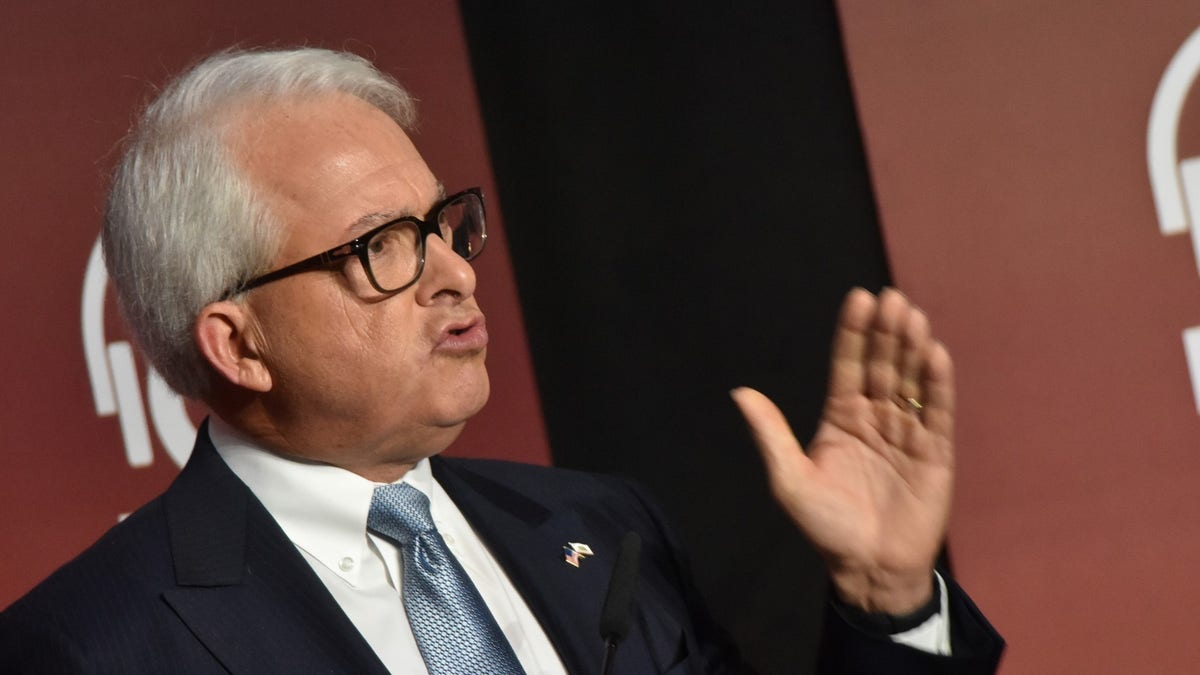
FILE -- California gubernatorial candidate John Cox. (REUTERS/Empowerment Congress/Leroy Hamilton/Pool)
John Cox is doing something remarkable for a Republican. A recent survey indicates he is now within striking distance of being elected governor of the infamously liberal state in November.
According to the Public Policy Institute of California, Cox (who I greatly respect and have worked with for years) has been gaining support since January and is now the second-place pick for governor among likely California primary voters. This puts him right behind the leading Democrat and represents a great potential for Cox to win the governorship seven months from now.
The poll result is important because California’s primary system for congressional and statewide elections is unusual.
Instead of running in individual party primaries, all candidates for governor of California – regardless of political party affiliation – will appear on a single ballot June 5. The two candidates who earn the most votes move on to the Nov. 6 gubernatorial election. Washington is the only other state that elects both congressional and state-level candidates this way.
California’s primary setup is a great system for silencing and drowning out political minorities, and it has likely been a big help to California Democrats since it was adopted in 2010. This is why Cox’s polling gains are so important.
In the Public Policy Institute of California survey, Cox earned 14 percent support against the five other primary candidates, as well as options for “someone else” and “don’t know.” This was up from 7 percent support in January. The top Democrat still has a significant lead on Cox, but nearly a quarter of likely voters in California remain undecided.
This race is also important for Republicans across the United States, because having Cox on the election ballot in November will be vital for keeping the Republican majority in the U.S. House of Representatives.
Republicans currently hold only 14 of California 53 House seats, all of which will be on the ballot this November. Any losses or gains in California could have a serious impact on the ability of Republicans to keep control of the House.
A survey by SmithJohnson Research found that 99.6 percent of California Republicans said they planned to vote in the June primary, with 97 percent reporting they “definitely will vote.”
However, when asked if they would vote in the November election if there were only Democratic candidates for governor on the ballot, only 56.1 percent of these Republican voters responded affirmatively, and only 42.8 percent reported they “definitely will vote.”
If California Republicans do not turn out in force in June and November, the Republican majority and President Trump’s agenda could be in trouble.
Clearly, Californians would benefit from Cox’s conservative leadership. The state is ranked worst for individual income taxes and 48th overall by the Tax Foundation’s 2018 State Business Tax Climate Index.
Cox would work to cut state taxes so that Californians would see more take-home pay and small businesses would be more able to grow, succeed, expand and create more jobs. This includes the hugely unpopular gasoline tax that the Democratic California Legislature and Democratic Gov. Jerry Brown imposed on drivers last year.
The expensive welfare and government dependency programs that California’s liberal leadership has embraced and enacted over the years have also made it the “poverty capital of America,” as Kerry Jackson wrote in a Los Angeles Times op-ed.
Jackson, a fellow of California studies at the Pacific Research Institute, pointed out that duplicative state and local welfare programs in California have resulted in nearly $958 billion in spending from 1992 to 2015. Yet when the cost of living is factored in, California has the highest poverty rate among states in America.
California is home to 12 percent of the national population but about one in three of America’s welfare recipients live in the state. As Jackson puts it: “The generous spending, then, has not only failed to decrease poverty; it actually seems to have made it worse.”
Establishing a system that promotes work and capability over welfare and dependency would do wonders to bring struggling Californians out of poverty.
We know this system works. We saw it work when we put work requirements on welfare benefits when I was serving in Congress, and we’ve seen it work in states such as Maine, where Republicans leadership moved 80,000 people out of the Medicaid program and 70,000 off food stamps.
Following these pro-work models, Cox could do wonders for replacing poverty with prosperity in California. You can bet the Democratic candidates will simply double-down on the government spending model and make the problem worse.
Democratic leadership has also made California a haven for criminals who are in the country illegally. Cox has pledged to end California’s lawless sanctuary policies and work with federal officials to get those who are in the country illegally and committing crimes off the streets and out of the country.
As governor, Cox would put the safety and interests of Californians over those of criminal non-citizens.
If Republicans are serious about keeping and growing our governing majority – and making America great again – we need to engage and build momentum in every election, at every level. Each fight we win will make winning the next ones more and more likely.
There’s no doubt: California will be a difficult battleground. Our opponents are entrenched and well-funded. However, if we can win there, it will show the nation that we can win everywhere.




















